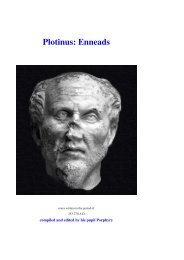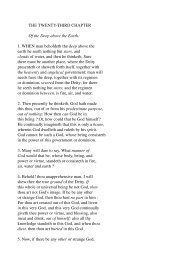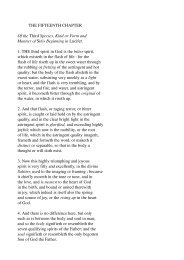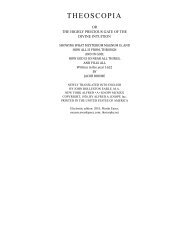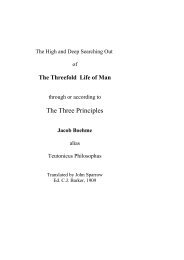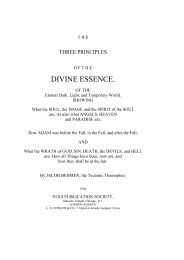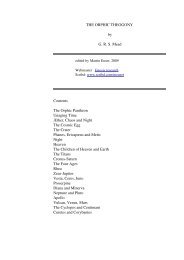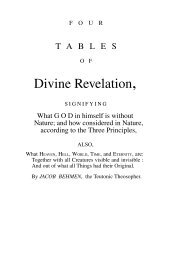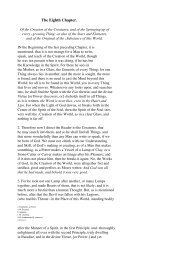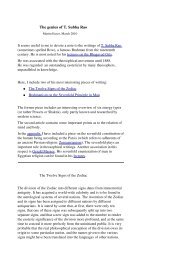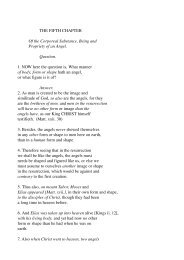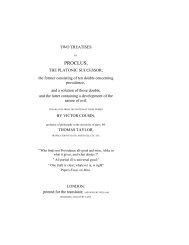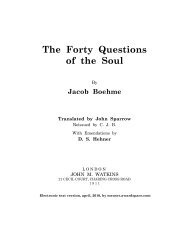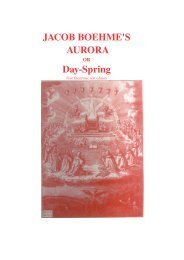Gerald Massey's Lectures - Society in evolution - Awardspace
Gerald Massey's Lectures - Society in evolution - Awardspace
Gerald Massey's Lectures - Society in evolution - Awardspace
Create successful ePaper yourself
Turn your PDF publications into a flip-book with our unique Google optimized e-Paper software.
and her Seven Children. The orig<strong>in</strong>al Genesis and all the chief Types are identifiably<br />
Egyptian to beg<strong>in</strong> with. But the Hebrew version was more directly derived from the<br />
Persian, as the Evil Serpent proves.<br />
Water was the first element of life recognized by the primitive perception. Water was<br />
considered to be the mother, or Maternal Source, personified. In Egypt the Mother of Life<br />
pours out the Water of Life from the Tree of Life! She is the first form of the Celestial<br />
Waterer. In the mystical sense, Blood is the Water of Life, and therefore the Mother of<br />
Life. This beg<strong>in</strong>n<strong>in</strong>g on earth with and from the water was Egyptian, Babylonian,<br />
Mexican, Indian, Ch<strong>in</strong>ese, Greek, British, Universal.<br />
It is said upon an Assyrian tablet that "the heaven was made from the waters." So <strong>in</strong> the<br />
Egyptian beg<strong>in</strong>n<strong>in</strong>g the sky was looked upon as the celestial water. This water was also<br />
entified <strong>in</strong> the river Nile, which was called the "Way of the Gods," when the Nature-<br />
Powers had been div<strong>in</strong>ised. In that sense, as it were, heaven descended, to be cont<strong>in</strong>ued<br />
on earth. From this water of heaven the land <strong>in</strong> Egypt was visibly deposited, and the earth<br />
was "compacted out of water and by means of water." When these were discreted there<br />
was the dry land. Here if anywhere is the primary h<strong>in</strong>t of a cosmical beg<strong>in</strong>n<strong>in</strong>g with a fact<br />
<strong>in</strong> nature, but not with a theory of nature nor a system of geology.<br />
The second element of life was Breath, anima or air. In Egyptian, breath or spirit is Nef;<br />
and this was personated by Kneph, a form of the first god, who is said to be the breath of<br />
souls, or those who are <strong>in</strong> the firmament. Nef, for breath and spirit, expla<strong>in</strong>s the Hebrew<br />
Nephesh for soul, as the breath of life. Kneph, the breath<strong>in</strong>g life <strong>in</strong> the firmament, is also<br />
the Sailor on the water! In the Hebrew version, Kneph becomes the Spirit mov<strong>in</strong>g on the<br />
face of the waters. In the Egyptian representation he sails the waters <strong>in</strong> his ark,--just as Ea<br />
does <strong>in</strong> the Akkadian version of the myth. The god Kneph is also the spirit that presides<br />
over the Bau, which had become the Pit-hole, or the Tomb from the Womb of the<br />
Beg<strong>in</strong>n<strong>in</strong>g. The Egyptian Bau is the Hebrew Bohu, or the Void. In both it is a place left<br />
unpersonified. In the later phase of personification this Bau of Birth becomes the<br />
Phoenician Baev, called the Consort of Kolpia, the W<strong>in</strong>d or Spirit. The Bau was also<br />
personified <strong>in</strong> the Babylonian goddess Bohu. The Phoenician Baev po<strong>in</strong>ts back to the<br />
Egyptian Bab (or Beb) for the hole, cave, well, source, or outrance--the orig<strong>in</strong>al of all the<br />
Babs <strong>in</strong> later language, <strong>in</strong>clud<strong>in</strong>g Babylon.<br />
Now, that which is performed by the Elohim en gros <strong>in</strong> Genesis is done by the Ali, or<br />
Seven Companions, <strong>in</strong> Egypt, most of whom can be recognized <strong>in</strong>dividually <strong>in</strong> relation to<br />
the Seven Elements. As the Hebrew Elohim, they may be dislimned and lose their<br />
likeness, but they are the same seven powers of eternal nature (as expla<strong>in</strong>ed by the<br />
Gnostics or Kabalists). In one of the Egyptian creation-legends--shown by a monument<br />
which was restored <strong>in</strong> the time of Shabaka--it is said of the Creator, "A bless<strong>in</strong>g was<br />
pronounced upon all th<strong>in</strong>gs <strong>in</strong> the day when he bid them exist, and before he had yet<br />
caused gods to be made for Ptah." This, it appears to me, has left another Egyptian mark<br />
on the first chapter of Genesis <strong>in</strong> the refra<strong>in</strong>, "And the Elohim saw that it was good,"<br />
which is uttered seven times over, <strong>in</strong> accordance with the sevenfold nature of the Elohim;<br />
and the bless<strong>in</strong>g is pronounced--"And God blessed them!" "And God blessed the seventh<br />
day!" It would be go<strong>in</strong>g to far afield to show all the Egyptian marks <strong>in</strong> one lecture; but I<br />
must offer another example. The Hebrew word employed for creat<strong>in</strong>g, when the Elohim<br />
form the heaven and the earth, is "Bara." The essential mean<strong>in</strong>g of the word is to give a<br />
manifestation <strong>in</strong> form to material previously without shape. Noth<strong>in</strong>g could so perfectly<br />
realize it as the potter at work on his clay. And the Egyptian image of a Creator, as the<br />
Former, is Khepr, who, as the Beetle, formed his little globe with his hands, and who, as<br />
Khepr-Ptah, is the Potter sitt<strong>in</strong>g at his wheel, and shap<strong>in</strong>g the egg of the sun and moon, or<br />
the vase of matter to conta<strong>in</strong> life--he who was the Former or Creator "<strong>in</strong> his name of Letthe-<br />
Earth-be." The Potter, <strong>in</strong> Hebrew and Phoenician, is the Jatzer; and this word is also<br />
applied to the Hebrew God as Creator, Jatzariah be<strong>in</strong>g Jah the Potter. Thus the Kabalist



